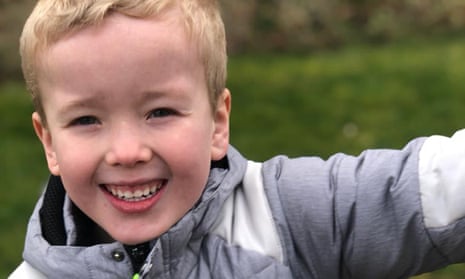A significant number of children remain in situations of “unknown and unassessed” risk, according to a report on children’s services in Solihull, triggered by the murder of six-year-old Arthur Labinjo-Hughes.
The inspection report, which was published on Monday, also found the council faced longstanding problems with staffing and that after Arthur’s high-profile case, social workers were “highly reluctant to work in Solihull either on a permanent or agency basis”.
Among a number of key findings, inspectors expressed concern that in a “significant minority” of cases, decisions in safeguarding were “overoptimistic” and lacked “professional curiosity”.
They also found incomplete police records had left children potentially “at risk of significant harm”.
The report followed a joint targeted area inspection of child protection services in Solihull that was called for by the education secretary, Nadhim Zahawi, in December. It concluded vulnerable children in the area had to “wait too long for their initial need and risk to be assessed”.
In December, Arthur’s stepmother, Emma Tustin, was sentenced for at least 29 years for his murder. He was physically assaulted, poisoned with salt and forced to stand in isolation for up to 14 hours a day at her home in Solihull in the months leading up to his death in June 2020.
The boy’s father, Thomas Hughes, was given 21 years for manslaughter.

Social workers visited Tustin’s house two months before Arthur’s death after concerns were raised by his grandmother Joanne Hughes about bruises on his back, but they concluded there were “no safeguarding concerns”.
The report into multi-agency responses to risks to children in Solihull was carried out by Ofsted, the Care Quality Commission, the Chief Inspector of Constabulary and Fire & Rescue Services and the Chief Inspector of Probation for England and Wales.
Joanna Barrett, head of policy at the NSPCC, said the report was “hugely concerning” and more needed to be done to prevent further tragedies. “It is absolutely crucial that safeguarding agencies in Solihull are better resourced and work together more quickly and efficiently,” she said.
“However, these issues are not confined to one area and we know that this is one piece of a much bigger puzzle affecting many local authorities across the country.”
The report said inspectors reviewed the records for one young child who was not linked to her father in the system, despite the father’s history of domestic abuse and drug use, and he being subject to a non-molestation order.
“Consequently, a domestic abuse incident the child was exposed to, involving her father, does not appear on her record … It is not obvious that the man poses a significant risk to her,” the report said.
The Local Safeguarding Children Partnership (LSCP) in Solihull had “experienced frequent changes of personnel … for a significantly long period of time”, the report said, leading to a loss of experience.
The workforce was “committed and knowledgable and dedicated to meeting the needs of children” but they faced immense pressure to meet daily demands and this reduced “their ability to respond swiftly to all concerns for children”, it said.
The report called for agencies in Solihull to send a written statement of action to Ofsted by 30 May.
In a joint statement, the minister for children and families, Will Quince, the minister for care, Gillian Keegan, and the minister for safeguarding, Rachel Maclean, said Arthur’s death was “horrific and deeply disturbing”.
“We must do everything we can to prevent any more cases like this. Each agency – police, health and children’s services – has an equal duty in this work and we are writing to all three to make clear our expectation that they participate fully in producing and delivering on a written statement of action,” they said.
Steve Cullen, speaking on behalf of Solihull LSCP, said: “On behalf of the safeguarding partners I want to provide assurance that we have taken on board all of the comments from the inspectors and we committed to work together to improve the way we protect children in Solihull and to do everything we can to ensure positive outcomes for our children and young people.”








